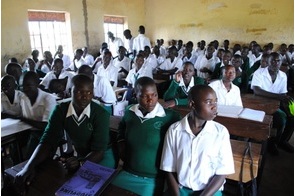How books can defuse the population bomb in developing countries

Summary
Countries need to acknowledge family planning as a human right and empower women to recognise their right in determining how many children they want to have and when it is convenient for them to have these children.
The most recent projection by the United Nations shows the world population would reach 9.8 billion by 2050 from the current 7.6 billion. The UN also states that out of the additional 2.2 billion people that may be added to the world's population by 2050, Africa will contribute about 1.3 billion, followed by Asia, which is expected to contribute about 750 million people. Hence, Africa will account for more than half of this expected growth.
As governments around the world seek to turn the population tide, one strategy that has proved to be surprisingly effective is teaching women to read. This is particularly important in the developing world, which is expected to account for much of the world's population growth. Developing countries have the highest fertility rates of average 4.3 births per woman. For example, Nigeria, currently the 7th most populous country in the world, with estimated 180 million people, is expected to become the world's third largest country, with a population of over 300 million by 2050.
In contrast to the 4.3 births per woman in most developing countries in Africa and Asia, the birth rate in Europe is just 1.6 births per woman. For the world to overcome hunger, poverty and illiteracy, we have no better choice than to control population growth in developing countries. This will help in reducing the pressure on already overburdened natural and economic resources in many countries across the globe.
The high and unstable population growth in most parts of Africa and Asia is one of the reasons proper planning for the wellbeing of every individual using the available resources is constrained. In Nigeria, an estimated 4.9 million people will be added to the country's population between July 2017 and July 2018 at a current fertility rate of 5.67 births per woman.
We are still going to have this huge number of people added to the population despite the likely decline in government revenues. Oil price decline automatically reduces government's revenue. When this happens for months, it sends shockwaves to the economy, crashing governments' non-oil revenue as well. This was the case in the fourth quarter of 2017, when total federally-collected revenue was 11.9 per cent lower than the receipts in the preceding quarter, according to Central Bank of Nigeria.
Here's the problem: While the population surges, there is no commensurate increase in job opportunities, health care services, social amenities, infrastructure and education support, among other basic needs. More people will have to do with less. To be sure, there has been some increase in domestic food production but certainly not enough to feed this teeming population without resorting to food imports to supplement the deficit.
One consequence of this is increased brain drain. For instance, more Nigerian educated citizens and professionals in various economic sectors or fields may decide to move abroad, especially for better pay and living conditions.
The Nigerian government and other policymakers in densely-populated developing nations should take bold steps in making sure that every life counts. To achieve this, we must strive to have a population that our resources can cater for and get rid of poverty and hunger. Teaching women to read in developing countries can help control population growth. The female literacy rate is a good predictor of birth rate. Therefore, educating females and encouraging them to proceed into obtaining higher education will slow down their decision to start a family and raise children. It will also help young females take informed healthcare and reproductive decisions.
Ominously, a 2015 estimate by United States Central Intelligence Agency (CIA) World Fact Book shows that only 49.7 percent of Nigerian females are literate. The value is much lower in South Sudan (with 16 percent female literacy rate), Guinea (22.8 percent), Burkina Faso (29.3 percent), Mali (29.2 percent), Afghanistan (24.2 percent), Liberia (32.8 percent), Pakistan (45.8 percent), Gambia (47.6 percent), Ethiopia (41.1 percent), Central African Republic (24.4 percent), and Niger (11 percent). Little wonder that these countries have population growth rates ranging from 2.1 percent to as high as 3.85 percent.
Furthermore, having a higher number of women in the formal work force could help a great deal. Encouraging female employment and ensuring job security will engage women formally and occupy them gainfully. That way, they are able to space pregnancies and child birth. Women who are gainfully employed alongside their husbands often produce fewer children than those who are not.
Of course, female literacy is not by itself the answer to unplanned population growth. When governments are faced with a population that is increasingly beyond the scope of available resources to adequately sustain its people, they can address the situation in a number of ways. For example, in the United States, the Title X Family Planning Program helped millions of low-income earners afford much-needed healthcare, and helped women avoid 1.9 million unintended pregnancies in 2014.
Governments and non-governmental organisations in countries with population surges should work together to promote birth control and contraception education, especially among the rural poor. It is not uncommon for a family in northern Nigeria to have 6 to 10 children. In fact, women in northern Nigeria have an average of more than seven babies despite the hardship.
Of course, terrible consequences are inevitable when these children cannot be properly taken care of. These include high level of malnutrition and hunger, increasing number of young people prone to being lured into terrorism, crime and other social vices.
Birth control campaigns in the media, in hospitals and birth centres could help a great deal. But we need to do more to enable people, especially the poor and less privileged, benefit from these campaigns. Also according to CIA World Fact Book, in 2016, contraceptive prevalence rate was as low as 20.4 percent in Nigeria.
Incentives could be introduced in areas known for high birth rates to enable the adoption of family planning strategies. For instance, vasectomy – also known as male sterilization – could be carried out for free in such areas with some compensation for men who have had specific number of children. Families can also be given free access to Intrauterine Device (IUD) for women to prevent pregnancy. Fertility awareness methods to track ovulation in women – a natural method of family planning – could also be widely publicised, although this method is 76 to 88 percent effective.
India is currently the second most populous country in the world and it has a high birth rate. Some Indian state governments in 2010 tried to slow births by paying couples to wait before having babies. USD 106 was paid to couples if they waited two years before having children. The aim was to correct the disproportionately high young population created by high birth rate, which was becoming a drain on the country's resources.
By 2014, eleven Indian states had passed laws to restrict Indians from having more than two children through the Two-Child policy. Some states have even gone a step further, refusing rights for the third child or higher number of children. Jail time and fines have been introduced for fathers who violate the birth ceiling, which is also disqualifying for holding public office. All these are attempts to stabilize population growth in the country.
Other effective steps that could be taken to control population growth include, getting strong support from religious and ethnic group leaders, and ensuring that men participate fully in family planning programmes. Countries need to acknowledge family planning as a human right and empower women to recognise their right in determining how many children they want to have and when it is convenient for them to have these children.
Uncontrolled and unstable population growth increases the rate of unemployment and underemployment, fuels poverty, hunger and rural malnutrition, increases crime rate, and depletes existing resources. The right time to take action is now. One thing we can do immediately is put more girls in classrooms and provide higher education support for them.
Financial Nigeria Columnist, Mojisola Karigidi, is a Nigerian biochemist and the founder and product developer at Moepelorse Bio Resources, is a Global Innovation Through Science and Technology (GIST) awardee, and an Aspen New Voices fellow.
Related
-
Preparing young people today for tomorrow’s world
Bilaad Realty’s “For Kids” approach to change involves organizing communities of industry leaders into ...
-
Students not getting remedial programmes post-Covid-19 school closures
In 2020, schools worldwide were fully closed across all four education levels for 79 teaching days on average.
-
Consortium plans $600mn investment in Africa’s education sector
The new company will be part of the SABIS network, which operates schools around the world with nearly 65,000 students.










